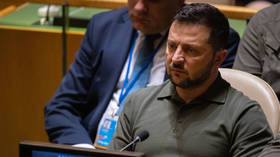Mobilizing for defeat: The Zelensky regime insists more Ukrainians must die before it’s all over
Kiev’s new effort to scoop up more bodies for the front is a response to looming catastrophe – and a catastrophe in itself

Ukraine’s situation is extremely precarious, if you want to put it optimistically. A more realistic term is “catastrophic.” The country faces steady, accelerating advances of Russian forces that are well-motivated and trained and superior in quantity and equipment. Even Ukraine’s commander-in-chief has admitted that “the situation on the eastern front has significantly worsened in recent days.” A massive understatement but still proof that things are even worse.
We also know – from Ukrainian polls – that ever more Ukrainians are open to ending the war by making concessions. Yet the Zelensky regime is doubling down. Instead of entering serious negotiations – the kind where you adjust your aims to your losses so as to avoid even greater ones – it is seeking to throw more lives into a war that has become a meatgrinder for Ukrainian troops.
That is the main purpose of a new mobilization law that has just passed the Ukrainian parliament. (In addition, President Zelensky has already signed off on additional measures that will be integrated into the new law once he signs that as well. In essence, though, this is one integrated bundle, which many Ukrainians and outside observers refer to as one and the same law, as will be done here.)
The new mobilization law is complex, consisting of a long list of measures, including, for instance, new rules on confiscating private cars for defense purposes. Its core, however, is simple: The minimum age for mobilization is lowered from 27 to 25 years of age. All Ukrainian men between age 18 and 60 will have to register, including those abroad. Failure to do so will count as evading military service. To make sure that compliance can be policed easily, all registered men must have their registration papers on them at all times.
The law, which has been under contentious consideration for months, is not being well-received in Ukrainian society. On a TV show run by Ukrainska Pravda, a very anti-Russian outlet, Maria Berlinska, a Ukrainian activist of equally sterling credentials, called it a fiasco. And she is by no means alone. It is true that some Ukrainian commentators have – once again – tried to dismiss all and any popular discontent as nothing but Russian interference. But this time, that tired old trick from the NATO-Zelensky playbook is not working well. Even Western mainstream media acknowledge the law is “unpopular.”
It is not hard to understand why many Ukrainians are angry. Perhaps the single worst disappointment is that the law does not include a hard rule for demobilization, which is what everyone expected. Think of it as a tacit deal: The government gets to hoover up more young men for cannon fodder, but, at least, it also promises to let go those exhausted soldiers who have already served (and survived) for years (36 months was under discussion). Even the New York Times has noticed that Ukraine’s current soldiers are “battered and exhausted.” Yet opening a way out for at least some of them is what did not happen. Instead, the Zelensky regime has dared come out with a law that only takes but gives nothing back.
To take how much, or to be precise, how many exactly? That is the second major sore spot: The law is meant to refill the ranks, which are clearly very badly depleted (massively contradicting the regime’s few and absurdly low – and thus mendacious – statements on casualty figures). High-ranking Ukrainian officers have gone public warning that “some” front sections that need to be held by eight to ten soldiers are, in reality, manned by two to four. That means that where 100 meters need to be defended, in effect, only 20 can be. Sure, such statements are also spin to drum up political support for the mobilization law. But from everything we know about the war, this spin is based on reality.
Yet what no one has done – either President Zelensky or anyone among his top brass – is to say exactly how many more Ukrainians they want. The former commander-in-chief Valery Zaluzhny had bluntly asked for half a million. That is one reason why he lost his job. His successor, Aleksandr Syrsky has got the memo and is keeping mum, only letting it slip that it will not be 500,000. How reassuring.
Clearly, the Kiev regime prefers to go on the prowl for more meatgrinder fodder without too much public scrutiny. Put yourself in their shoes for a moment: If you had to drag, let’s say 300,000 mostly very reluctant and potentially rebellious men off to a war without a chance, would you like them, their families, and friends to know just how many they are? And by the way, 300,000 is a number Zelensky has mentioned, if in a very roundabout way, namely as his estimate (it’s no more than that, of course) of additional troops soon to be fielded by Russia.
The third main cause of public discontent about the new mobilization law is that it is unjust. Ordinary Ukrainians have a keen and absolutely realistic sense that their “elites” – in politics and business, and usually both in one and the same people – are not sharing the risks and sacrifices of war. This fact, too, the regime and its media try to propagandize away as “Russian manipulation.”
Yet the fact is that no such outside interference is needed. Take, for instance, Berlinska on Ukrainska Pravda again. She is all for continuing the war for years (and has entirely unrealistic ideas about how to do so). And yet she also asks why “should the child of a mother from a forlorn village….turn into a flag in the ground [that is end up on one of those massively expanding military cemeteries], while someone [else] can ride around Kiev in expensive cars, go on expensive holidays abroad, simply get rich and do business during wartime?”
Now add to all of the above, the following: Those who were eager to fight have already volunteered. When they volunteered, moreover, misguided optimism was widespread. Those illusions have evaporated by now. Whoever is forced to fight now knows two things: The war is not going well (which is the reason why he is being drafted, actually) and family members, friends, or work acquaintances have already fallen or, if “lucky,” been taken prisoner or come back with severe, possibly lifelong injuries and psychological trauma. Finally, sending even more of the young to fight the proxy war for the West also makes Ukraine’s severe demographic problem even worse, wasting not just one generation but the fathers (and some mothers, too) of the next one, too.
This mobilization law is a hapless response to the catastrophe of looming defeat. It is a catastrophe in and of itself. Ideally, it would be the last straw, finally provoking Ukrainians to rebel against a regime that has sold them out to US and EU geopolitics. Ideally.
The statements, views and opinions expressed in this column are solely those of the author and do not necessarily represent those of RT.
https://www.rt.com/russia/595870-ukraine-mobilization-zelensky-defeat/




0 Comments:
Post a Comment
Subscribe to Post Comments [Atom]
<< Home